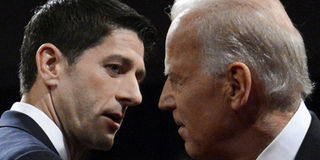Foreign policy jabs lay ground for Obama, Romney

PHOTO | MICHAEL REYNOLDS | POOL US Vice President Joe Biden (R) and Republican vice presidential candidate Paul Ryan depart the stage following their vice presidential debate at Centre College in Danville, Kentucky, on October 11, 2012.
What you need to know:
- The Democratic vice president, a foreign policy player in Washington for decades, and Ryan, a conservative budget hawk with little experience in the wider world, argued sharply on Iran, Afghanistan, Libya and the Arab Spring
- Biden was shakiest on the attack on the US consulate in Benghazi, while Ryan struggled to sketch an alternative policy to the White House on Iran, Afghanistan and Syria, despite slamming Obama's foreign policy as inept
- Ryan struggled to rebut Biden's charge that Romney's rhetoric was bellicose and empty and he failed to distinguish exactly what the Republican ticket would do differently in the world if elected on November 6
Joe Biden and Paul Ryan waged the most meaty foreign policy exchanges of the entire White House race in their vice presidential rumble, which exposed national security liabilities on both sides.
The Democratic vice president, a foreign policy player in Washington for decades, and Ryan, a conservative budget hawk with little experience in the wider world, argued sharply on Iran, Afghanistan, Libya and the Arab Spring.
Both men posed unanswered questions and identified political vulnerabilities sure to be exploited by President Barack Obama and Republican ticket headliner Mitt Romney in their two remaining debates in the next 10 days.
Biden was shakiest on the attack on the US consulate in Benghazi, while Ryan struggled to sketch an alternative policy to the White House on Iran, Afghanistan and Syria, despite slamming Obama's foreign policy as inept.
The Republican used the debate before millions of television viewers Thursday night to sharpen Romney's offensive on Obama's shifting account over the death of the US ambassador to Libya on September 11.
Biden, like other senior officials since the deaths of four Americans, failed to get the administration's story straight and may actually have poured fuel on the row over apparently inadequate security in Benghazi.
"We weren't told they wanted more security ... We did not know they wanted more security," Biden said, as a row rumbled in Washington on the assault on the compound by militants.
But his statement contradicted testimony from security officials at a congressional hearing this week that a request for extra protection for US posts in Tripoli and Benghazi was turned down by the State Department.
Ryan saw the death of Stevens as a vehicle for a wider attack.
"What we are watching on our TV screens is the unravelling of the Obama foreign policy, which is making the world more chaotic and us less safe."
While the Republican made Biden uncomfortable on Libya, his handling of other global hotspots was less assured.
Ryan struggled to rebut Biden's charge that Romney's rhetoric was bellicose and empty and he failed to distinguish exactly what the Republican ticket would do differently in the world if elected on November 6.
Biden lauded Obama for getting troops home from Iraq, while lashing Romney for saying the complete US withdrawal was "tragic" and skewered Ryan on his critique of the US plan to get out of Afghanistan by 2014.
Ryan tried to spin a hard-to-sell argument that though Romney backed the 2014 timeline, it was wrong to tell US enemies when NATO troops would quit, and that US generals, not politicians, should dictate the pace of withdrawal.
Biden, scenting political gain on an unpopular war, was unequivocal: "We will leave in 2014."
Ryan also struggled to accompany Romney's searing criticism of Obama's policy on Iran and Syria with a clear picture of how the Republicans would change tack.
He portrayed Obama as feckless on preventing the nuclear weapon that western nations believe Iran is trying to build, and said that "the ayatollahs" did not view Obama threats of last resort military action as credible.
But he was undermined by the fact that the White House has imposed the most punishing sanctions yet on Iran.
"They're working. And the fact is that they are being crippled by them. And we've made it clear, big nations can't bluff. This president doesn't bluff," Biden said, warning Romney's "loose talk" could trigger a new US war abroad.
Ryan also scorned Obama's failure to halt the vicious civil war in Syria, and mocked the administration's earlier view of President Bashar al-Assad as a potential negotiating partner.
He complained that Obama had allowed Russia to block tougher sanctions against Assad at the United Nations, and said he had not sufficiently corralled Arab world allies to arm the Syrian opposition.
"What would my friend do differently? If you notice, he never answers the question?" Biden said, narrowing in on the weaknesses of the Romney position.
Thursday's jabs foreshadowed the foreign policy jousts to come between Romney and Obama but in an election dominated by the economy, it seems unlikely that national security will move significant numbers of votes.
Biden's struggles on Libya may have the most potential to drive campaign news stories in coming days, though so far no information has come to light to prove that Obama is personally to blame for lax security in Benghazi.
The president, who repeatedly highlights his decision to mount a raid to kill Osama bin Laden and his ruthless campaign against Al-Qaeda, still appears to be on firmer political ground on national security than Romney.




